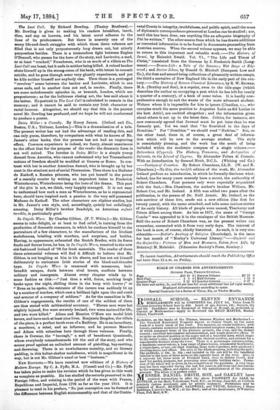In Cupids Wars. By Charles Gibbon. (F. V. White.)—Mr. Gibbon
seems to take delight, or at least to find relief, in turning from the production of domestic romances, in which he confines himself to the portraiture of a few characters, to the manufacture of the liveliest melodramas, bristling with murders, and surprises, and battles. Having, to appearance, exhausted the Scotch Border, with its fierce feuds and fiercer loves, he has, in In Cupids Wars, resorted to the now old-fashioned Ireland of '98 for fresh materials. The reader of these three substantial volumes will find it difficult to believe that Mr. Gibbon is not laughing at him in his sleeve, and has not set himself deliberately to caricature Irish stories of the blood-and-thunder type. In Cupids Wars is crammed with massacres, hair- breadth escapes, duels between rival lovers, conflicts between military and insurgents. Almost every chapter winds up in some fashion as this :—" Jest then a wild, fierce, mocking laugh broke upon the night, chilling those in the keep with horror ;" or " Even as he spoke, the entrance of the cavern was suddenly lit up by a number of torches, which cast a brilliant light upon the red coats and armour of a company of soldiers." As for the casualties in Mr. Gibbon's engagements, the results of one of the mildest of them are thus stated with arithmetical accuracy. "Eleven men were but slightly injured, five were severely bruised, two were maimed for life, and two were killed." Aileen and Maurice Olfore are model Irish lovers, and have each at least nine lives. Benjamin Brogden, the villain of the piece, is a perfect broth even of a Rathboy. He is an incendiary, a murderer, a rebel, and an informer, and he pursues Maurice and Aileen with relentless hate through three volumes. Finally, there is Cormac, the " boccagh," a sort of beneficent Quasimodo, whom everybody misunderstands till the end of the story, and who -seems proof against an unlimited amount of pistolling, bayonetting, and drowning. There is no unwholesome morality, and no literary padding, in this helter-skelter melodrama, which is magnificent in its way, but is not Mr. Gibbon's usual or best "business."


































 Previous page
Previous page